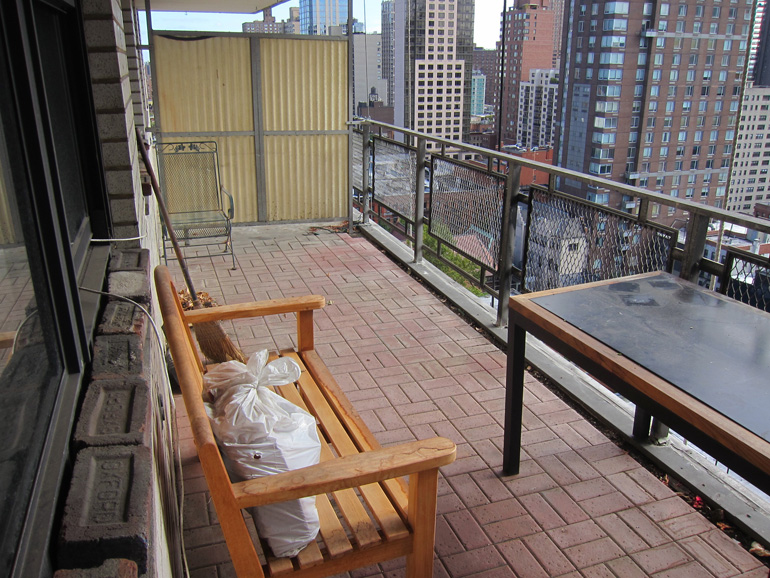
It is now a week since anyone but Kathleen was here at our rented house on Fire Island (and even Kathleen herself is away at the moment), but it feels more like a month. The days pass quickly enough, but, having receded into the past, they double or triple in bulk, so that two or three fill up the memory-space of a week. The other odd thing is that what looked like an alarmingly bare larder as recently as Sunday now seems stuffed with food that we’ll never get through. What happened, I think, is that my everyday expectation of culinary quality and variety gave way to something much less demanding. Last night, I found a burger in the freezer and broiled it. It wasn’t beef, or just beef, but some sort of meat-loaf mix — very odd, when that’s what we had for dinner the Friday night of Labor Day weekend. I cooked a slice of bacon and found a remnant of cheddar cheese for the topper. What with macaroni salad from the Pantry on the side, I did without an English muffin. It was a bland dinner, but it filled me up, and that was that; also, one less thing to throw away. That’s what it’s come down to: a timeless, Magic Mountain zone in which I’m eating prospective refuse. Although I’m perfectly comfortable, I’m glad that I have only one more day of this.
I really did feel that I was resting at some old-timey sanatorium yesterday morning. It was so chilly that I sat in the sun the moment the light hit the deck. I sat with my back to it, wearing a hat and a heavy cardigan and a blanket over my legs. I sipped tea and watched the monarch butterflies. Without really trying, I must have seen more than a dozen yesterday. They are migrating through here, on their way to Mexico. We have learned some interesting things about monarch butterflies. The lifespan of those born at the beginning of summer is less than two months, but the “migratory generation” can live for up to seven. No butterfly lives to make a complete round trip, so the migratory pattern is entirely inborn — or at any rate it is not well understood. Until this week, spotting a monarch has always been something of an event (not that I would ever see one if attention were not called to it by someone else), but yesterday, I might look up from my book and see three or four fluttering in crazy assembly across the rushes. The traffic promises to be even heavier today. Â
Whether I’ll be sitting out in the sun again remains to be seen. I have some boxes to take to the post office, one full of Will’s toys and the other packed with books. Also, I don’t have anything to read.
***
Of course, it hasn’t come to that. But I’m left with stuff that I won’t be reading in big doses. There’s Bendetta Craveri’s book about Mme du Deffand, the great hostess of Enlightenment Paris; rather than begin at the beginning (as usual), I’ve jumped to the chapter about Deffand’s strange romance with, of all people, Horace Walpole. Never have I read so satisfying a portrait of the English aristocrat; everything that Craveri writes confirms something or other that I’ve read about him over the years, and puts it in relation to the other bits. It would be wrong to say that the first prime minister’s second son has been a model to me, but I believe that we share a fastidious resistance to the mental deformities that accompany professionalism. (The serious professional cannot talk about what he or she does, because it is either abstruse or confidential or both.)
Les deux créations auxquelles il consacre pendant un demi-siècle ses soins les plus attentifs, son immense correspondance et sa demeure-musée de Strawberry Hill, sont, à cet égard, significatives, car ce sont deux activités parfaitement compatible avec la condition de gentilhomme. Face aux affaires publiques, l’attitude de Walpole est celle de quelqu’un qui a l’habitude de la politique et qui n’en a pas la passion.
That sounds familiar. A few pages of Creveri, however, are all that I can swallow, largely because of the excerpts from Deffand’s letters. They are models of lucidity and so forth, but that’s the problem: they’re models. In the Eighteenth Century, everyone with a brain strove to write model prose. You can’t tell writers apart in this, the most intimate of genres. The fault is mine, I’m sure; had I read more diligently in this literature, Mme du Deffand would not be reminding me (alarmingly!) of Mme de Merteuil.
Then there is a book on “Chinese” Morrison that I can’t bring myself to discuss; allow me a spell of mystification on that title. What’s distressing is this Timothy Mo book, An Insular Possession. I had never heard of Timothy Mo, before coming across his name in a list of authors recommended by Diana Athill. In my ignorance and lack of sympathy, I have to say that Mo reminds me of Patrick O’Brian, whose popular Jack Aubrey books I simply cannot read. Here is where I stopped last night (a group of American agents and sailors are shooting in the marshes near Whampoa Island):
A brisk walk of twenty inutes sees them back to their starting-point. The others cheer ironically. MacQuitty barks a welcome. He brings a soft, drooping mass of feathers and bill to them in his mouth and drops it at their feet. This is merely one of a brace; all told, the others have accounted for eight brace.
“A darnation fine morning’s sport,” one of the mates tells Eastman.
They have arranged their bag over the leaves on the upturned boat’s keel, the beautiful plumage set off to advantage against the brilliant green when glimpsed thorugh the latticed frame of the bamboos. A pair of guns lie crossed against the boat, completely the tastefully contrived tableau. Eastman’s fingers itch for what they manage best, neither gun not cue but … [sic] a pen or brush. Still life is actually what he realises most successfully, and, in this kind of accomplishment, does not suffer by comparison with O’Rourke, who regards it as a form of necrophilia, the objectionable object, nadir of artistic endeavour. (And has told Walter Eastman so.)
“You are doleful failures at either form of the ‘pot’,” says the odious Ridley.
If I cared anything at all for this, I would want to know what “pot” refers to, or what it is about Ridley that makes him odious, but I don’t. What has kept me going is the prospect of the Opium War, which looms somewhere over the novel’s remaining seven hundred pages. I can’t think how I’m going to get there.
***
I had saved Maria Semple’s new book, Where’d You Go, Bernadette, for a day like yesterday, when I’d be all alone and tired of my usual occupations. I thought that I just might read it in a day, but was really surprised to find that it took only a few hours to get from start to finish. The dust jacket carries a blurb from Jonathan Franzen: “I tore through this book with heedless pleasure.” Exactly. And the problem with heedless is pleasure is that, once you’ve gulped down the happy ending, you’re calling for the next dish.
At the risk of presumptiousness, I will say that neither Jonathan Franzen nor I is a reader capable of taking heedless pleasure in heedless writing about heedless characters. No, Where’d You Go, Bernadette is a very well-constructed entertainment, full of vivid and interesting characters who thrash about in a poopy stew of contemporary pieties. The plot is an infernal machine that strains plausibility just enough to impel the turning of pages. The comedy depends upon the characters’ inability or unwillingness to develop. It isn’t personal growth that’s wanted, but something rather the reverse, a sound simplification, a “getting back to basics.” The Seattleites in Semple’s slice of life have overdosed on improving concepts, a disorder for which the only known detox program is the reading of a novel such as this one. In an important sense, Semple has updated Cyra McFadden’s 1978 assessment of the emperor’s new clothes, The Serial.
The villain of the piece here is bad writing, examples of which Semple artfully parades in the series of emails and announcements that constitute the bulk of the narrative. Every now and then, little Bee Branch, a straight-A eighth-grader, takes the floor, and everything that she says makes plain good sense, even when she insists that she hates her Dad (she doesn’t); but most of what we read is, well, heedless self-display, in the form of ill-considered, cant-ridden missives. Semple establishes the key at the very beginning, with the mission statement of Bee’s school: “a place where compassion, academics, and global connectitude join together to create civic-minded citizens of a sustainable and diverse planet.” The gist would be better-served by something less glib, and certainly no reputable academy ought to dabble in “connectitude.”
The title character, Bee’s mom, reminds me of Amfortas, in Parsifal. In a youthful and heroic attempt to battle the forces of heedlessness, she was bested by an evil man, and she has been languishing with the wound ever since. You could say that she has been a great mom to Bee, but even there she might have been better, by providing her daughter with a more impervious roof overhead. Straight Gate, the hilltop former home for wayward girls that Bee calls home is nothing less than Bernadette’s wound made visible, and, in fact neither parent calls it home. Bernadette spends her days in an Airstream trailer behind the house, while Bee’s father, Elgin, heads a major development project at Microsoft and is usually on the Campus. (Elgin takes the company bus to work in order to save himself an hour of Bernadette’s morning rants about the impossibility of living in Seattle, something that, agoraphobe that she has become, she knows little about.) Bernadette, an architect with prestigious training and a MacArthur genius grant, meant to do something with the broken-down old house, but she has spent the entirety of Bee’s life, and then some, feeling sorry for herself and superior to everyone else — “everyone” consisting, in this case, of the mothers of the other children at Bee’s school. Bernadette dismisses these women as “gnats.” In the course of the novel, she is reminded that this is not a constructive view to take of fellow-creatures, but that’s precisely why you can’t speak of her finding wisdom in the ordinary sense. She knew it all along, but indulged in oversight. As for the two gnats with whom she clashes, they, too, have to recollect the sense they were born with.
My complaint is the best possible one: I wish that this book were longer, quite a bit longer. I’d like to have known a lot more about Elgin, whose background is fairly telegraphed, with a no-account brother making a surprising, disproportionate appearance (and quick disappearance). Bernadette’s Park Avenue background, too, come to think of it. To say that a lot of threads go untied at the end is an understatement; with its last-act shift to the waters off Antarctica (foreseen from the start), Where’d You Go, Bernadette casts off any concern for mundane tidiness. It seems to be a case of confusing the White Continent with “the basics.”
Ordinarily, of course, I’d tuck in a slab of text, some more or less representative sample of Maria Semple’s prose style. But it’s not possible; Semple’s prose style (quite a lovely one, as you’ll recall from This One Is Mine) is completely effaced by her project, which is to capture a representative sample of the way we write badly today. No one specimen speaks for the whole. The sixth document in the collection, a mailing from a consultant who has been hired to help improve the prestige of Bee’s school, is a glorious monstrosity of dead cliché (cliché born dead, that is), but in its two pages, Semple says it all, and there’s no call for more. The best that I can do is to file a portion of Bee’s report on the Rockettes.
That night, I went to the Radio City Christmas Spectacular with Youth Group. The first part, with the Rockettes, was annoying. All it was, was piped-in music while the Rockettes kicked. I thought they would have at least sung, or done some other kind of dancing. But they just kicked in a line facing one direction. They kicked in a line facing the other direction. They kicked in a line with the whole line twirling, to songs like “It’s Beginning to Look a Lot Like Christmas” and “I Saw Mommy Kissing Santa Claus.” The whole thing was junk. Kennedy and I both were like, Why?
I wouldn’t have asked for anything different. Just more of same. I hope that, next time, Maria Semple isn’t in a hurry to finish her novel.




















